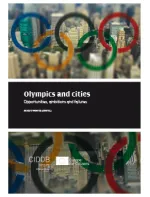Olympics and Cities: Opportunities, Ambitions and Failures

This collaborative volume - written by CIDOB researchers - explores the challenges and opportunities for cities hosting the Olympics. Since their inception over a hundred years ago, the modern Olympic Games have been surrounded by politics. They have been used to further national interests, showcase ideological worldviews and draw attention to causes (e.g. the fight against racism and gender discrimination). Since the 1980s the economic dimension of the Olympics has moved to the forefront following increased commercialisation via television deals and sponsorship. Host cities seek to outbid each other in search of prestige and urban remodelling. Citizens, on the other hand, are increasingly concerned about the costs and the corruption scandals connected with the organisation of the games. The summer games this year in Rio de Janeiro are a case in point. Awarded to the city in 2009 at a time of widespread optimism about the economic prospects of emerging markets like Brazil, the country now suffers from a commodity bust and a social crisis. In fact the Olympics produce less enthusiasm in Brazil than criticism. More sustainable and socially acceptable games will be a challenge for future hosting cities.
E-ISSN: B 17500-2016